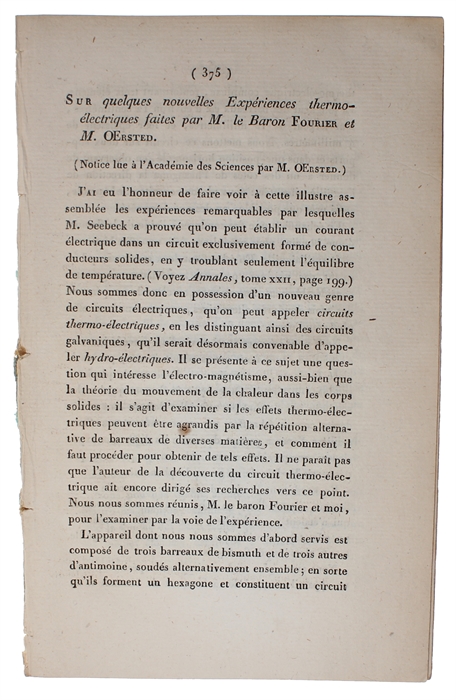COINING THE TERM "THERMO-ELECTRICITY" AND INVENTING THE "THERMO-ELECTRICAL PILE"
ØRSTED, (OERSTED), H.C. & (JEAN-BAPTISTE-JOSEPH FOURIER).
Sur quelques nouvelles Expériences thermoélectriques faites par M. le Baron Fourier et M. Oersted. (Notice lue à l'Academie des Sciences par M. Oersted).
(Paris, Crochard, 1823).
8vo. Without wrappers as extracted from: "Annales de Chimie et de Physique, Par MM. Gay-Lussac et Arago.", Vol. 22, pp. 375-389.
First appearance of this paper, revealing the results of experiments with the galvanic elements, using pairs of small antimony and bismuth bars welded in series, which Oersted performed together with Fourier during his visit to Paris. This constitutes the invention of the first thermo-electrical pile. Oersted and Fourier had found that heat had a significant effect upon the performance of the galvanic element. - "Seebeck seems to have had another theory about this. However, I have experimented with the matter, and found the conjecture correct. I believe that this discovery will be of far-reaching consequence. The laws for this new effects are, I suppose, in reality the same as for the galvanic battery; yet this looks so different that I have been obliged to spend a great deal of my time during the last fortnight in discovering and defining them...". In a letter of somewhat later date to prince Christian, he states that he has made the experiments "in conjunction with Fourier, the secretary of the mathematical department of the Institute". Oersted, when reading this paper to the Academy on 31st of March 1823, proposed the name "thermo-electric" for these currents, a name which has since been adopted everywhere. Ronalds Catalogue p. 374. - Ørsted, Works II, p. 272. Stitched together with this paper is "Extrait d'une Lettre de M. Ampere à M. Faraday". Pp. 389-400. First printing. Dealing with electricity.
Order-nr.: 41869

